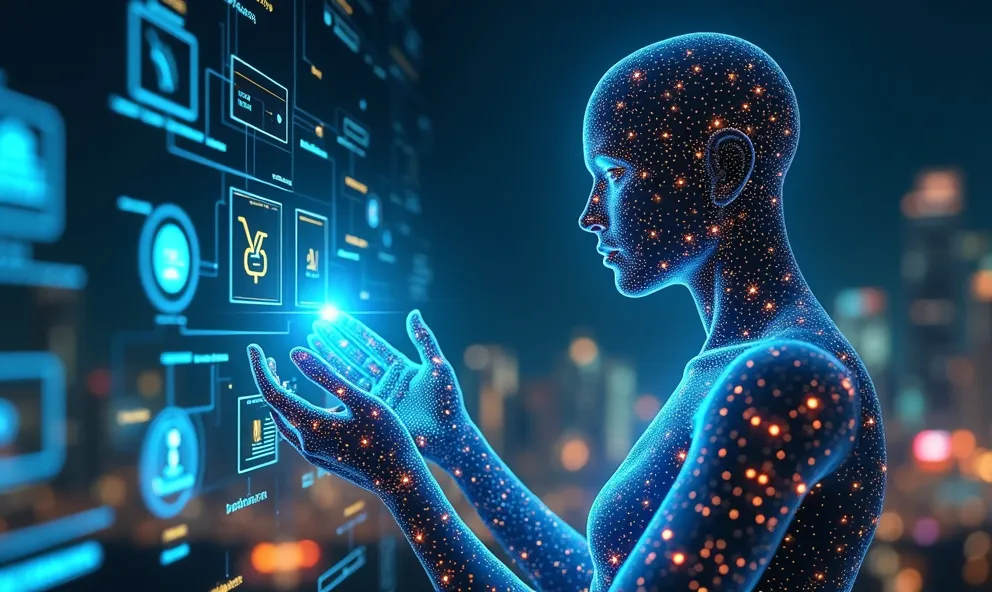In many ways, artificial intelligence (AI) is changing our environment. The emergence of AI intelligent agents is one of the most important developments in AI. These intelligent algorithms are capable of data analysis, decision-making, and even experience-based learning. But why are AI agents so crucial, and how do they operate? The fundamentals of artificial intelligence agents, their operation, the various kinds of AI agents, and actual instances of AI agents in action will all be covered in this blog.
Table of Contents
What Are AI Intelligent Agents?
An artificial intelligence (AI) intelligent agent is a system that senses its surroundings, interprets data, and acts to accomplish an objective. These agents may be hardware-based, like self-driving cars, or software-based, like virtual assistants. AI agents can adjust and learn from fresh data, in contrast to conventional computer programs that adhere to predetermined instructions.
AI intelligent agents play a crucial role in robotics and machine learning by assisting machines in making decisions on their own. They use complex algorithms to analyze large amounts of data and choose the best course of action. This makes them applicable to a wide range of sectors, including healthcare, banking, and even entertainment.
How Do AI Agents Work?
The functioning of artificial intelligence agents follows a structured process:
- Perception: Using sensors, cameras, or other input techniques, the agent gathers information from its environment.
- Processing: It uses machine learning models and algorithms to examine the gathered data.
- Making Decisions: The AI intelligent agent chooses the optimal course of action based on its analysis.
- Action: The agent acts, such as guiding a robot or reacting to a spoken order.
- Learning: By gaining knowledge from past interactions, the agent gets better over time.
Deep learning methods enable agents in more advanced AI systems to forecast results and gradually enhance their decision-making. They are very helpful for identifying fraud, diagnosing illnesses, and even streamlining supply chains because they can identify trends and anomalies in data.
Different Types of Agents in AI
Each of the five categories of AI beings has distinct talents.
1. Basic Reflex Agents
These agents function according to established guidelines and standards. They do not learn from experience; instead, they respond to inputs. As an illustration, consider a thermostat that activates the heater when the temperature lowers.
2. Reflex Agents Based on Models
These can make better decisions because they remember past acts and their outcomes, unlike basic reflex agents. An autonomous vehicle that is aware of the state of the road is an example.
3. Agents Based on Goals
These agents base their decisions on their goal, which is to accomplish a particular objective. An AI that plays chess and plots moves to checkmate a rival is an example.
4. Agents Based on Utility
These agents weigh the pros and drawbacks of several potential courses of action before selecting the best one. One example is an AI travel booking system that locates the quickest and least expensive flights.
5. Agents of Learning
By gaining knowledge from past events, these agents gradually enhance their performance. Chatbots that improve their ability to respond to consumer inquiries are one example.
Multi-agent systems, in which several AI agents cooperate to accomplish a common objective, are another new category. These systems are used to boost performance and efficiency in financial trading, logistics, and robotics.
Also Check: Best Deepseek Alternatives
Examples of AI Agents in Everyday Life
We interact with AI agents more often than we realize. Here are some popular examples of AI agents:
- Virtual assistants: Such as Siri, Alexa, and Google Assistant, can assist with things like playing music, answering queries, and setting alarms.
- Chatbots: Businesses use chatbots to assist their customers.
- Self-Driving Cars: Self-driving cars use AI to navigate roadways properly.
- Recommendation engines: Like Netflix, YouTube, and Amazon make products, movies, or video recommendations based on user preferences.
- Fraud Detection Systems: These systems detect questionable financial transactions.
- Smart Home Devices: Control the temperature, lighting, and security systems using smart home devices.
- Healthcare AI Agents: Help physicians identify illnesses and suggest therapies.
- Financial trading bots: Use market patterns to inform real-time trading decisions.
More intelligent agents will be incorporated into our daily lives as AI develops, increasing productivity and customization.
Why AI Intelligent Agents Matter
1. Boosts Productivity
By automating monotonous operations, AI agents free up human labor for more intricate jobs, leading to faster decision-making and improved efficiency.
2. Enhances Decision Making
To make precise conclusions, artificial intelligence agents examine vast volumes of data.
3. Improves the User Experience
Users’ experiences are personalized by recommendation engines and smart assistants, making interactions more seamless and intuitive.
4. Lowers Human Inaccuracy
AI reduces errors in jobs like financial analysis and medical diagnosis since it uses data-driven logic.
5. Encourages Innovation
AI agents are driving new developments that improve everything from healthcare to transportation, enhancing efficiency, accuracy, and overall user experience across industries.
6. Encourages the expansion of businesses
By automating processes, cutting expenses, and enhancing customer interaction, businesses that use AI intelligent agents obtain a competitive advantage.
7. Strengthens Security
AI agents are employed in cybersecurity to detect dangers and stop cyberattacks before they do damage.
Check Out Our Blog Post On: Best AI Social Media Tools
The Future of AI Intelligent Agents
The role of AI intelligent agents will only grow in the coming years. Here’s what we can expect:
- More Human-Like AI Agents: AI agents of the future will be more sensitive to context, emotions, intent, tone, and behavior.
- Increased Automation: AI will handle more jobs in sectors including banking, healthcare, education, retail, manufacturing, logistics, customer service, marketing, finance, and cybersecurity.
- Better Security: More advanced AI agents will be able to identify fraud and cyber threats more quickly.
- Sustainable Solutions: AI will minimize waste and optimize energy use.
- AI in Space Exploration: Intelligent agents will help astronauts on planetary exploration, space expeditions, data analysis, autonomous navigation, communication, decision-making, robotics, hazard detection, resource management, and system monitoring.
- Personalized Education: AI-powered tutors will offer tailored lessons according to each student’s development.
With continuous advancements in AI, we will see even more intelligent agents that enhance our daily lives and transform industries worldwide.
Conclusion
AI-powered intelligent agents are shaping the future of technology. These artificial intelligence agents, which range from self-driving automobiles to virtual assistants, are essential in simplifying our lives. Knowing the many kinds of AI agents enables us to recognize their potential and skills. We anticipate that AI agents will grow ever more potent and effective as technology develops. Examples of AI agents in customer service, healthcare, and entertainment demonstrate how AI is transforming human interactions with robots. AI has a bright future ahead of it, and its full potential is only just being realized!
FAQs
AI intelligent agents are systems that perceive their environment, process data, and take actions to achieve specific goals, often improving over time through learning.
They follow a structured process of perception, data processing, decision-making, action execution, and learning from past experiences to improve future responses.
AI agents are categorized into five main types: Simple Reflex Agents, Model-Based Reflex Agents, Goal-Based Agents, Utility-Based Agents, and Learning Agents.
Yes, some common AI agents include virtual assistants like Siri and Alexa, self-driving cars, recommendation systems on Netflix and YouTube, fraud detection systems in banking, and chatbots for customer service.
They enhance productivity, improve decision-making, reduce human errors, personalize user experiences, drive innovation, and strengthen security.
AI agents use machine learning algorithms and deep learning techniques to analyze past data, recognize patterns, and adjust their actions accordingly.




